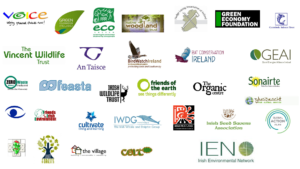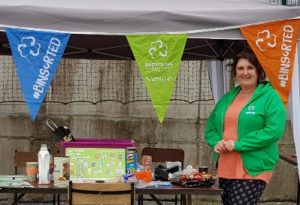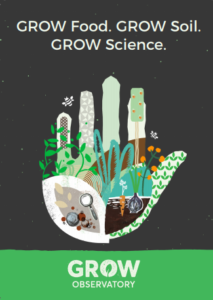Is your environmental mojo waning? Are you losing the will to get out there and campaign, to fight the battle for nature as major corporations and politicians put their own agenda before those of people, wildlife, flora and fauna? Have you stopped thinking that you can make a difference in the tsunami of climatic problems that are engulfing our media?
Whether you are looking for a way to become more environmentally active, or are in need of some fresh motivation, this article is for you. It suggests three Irish (and European) community-based initiatives that might help to fire up your enthusiasm. However, It took a blip in my own mojo for me to realise that we need them as much as they need us.
Algorithms – good or bad?
Algorithms are set on social media to show and share our interests so they have meaning for us. Most of the time I feel that’s a good thing; I enjoy reading and learning more about favoured topics that have been suggested for me, and that includes the environmental news and stories. Lately, I’ve been feeling overwhelmed by the barrage of doom-filled stories and false information that I’m not sure whether to believe or not, so much so that I was beginning to think that ‘they’ve’ finally worn me down. I’ve been suffering from activists burnout and my instinct has been to hunker down and protect myself before exhaustion overwhelms.
This thread was picked up on “twitter moments” today (not really sure how that works)….now my notifications have blown up, complete with expletive-filled responses. Is this some kind of milestone?https://t.co/9nkRmumqTV
— David Zierden (@FLClimateCenter) July 14, 2018
It all came to a head after I finished my horticulture studies. I was thrilled to receive my provisional results having achieved the grades that I had worked hard for in the Advanced Certificate for Horticulture, but that quickly fell to a flatness that I wasn’t expecting. As I sat in tears on the phone to my Mum I was reminded of the time our eldest teen started school and came home bawling after just a week there. “Why can’t I read and write Mammy?” he asked. “You said I’d be able to read and write when I went to school”. I guess the same thing happened to me.
For two college years, I’d worked hard to better myself, to validate everything I’ve been doing for the previous ten. I had juggled, in no particular order, our teens, marriage, home life, garden, work, volunteering, funding applications, educating and being educated as I filled my mind with facts and figures about market gardening, ecology and the environment, trees, shrubs, customer services and entrepreneurship. Throughout that time I had somehow talked myself into thinking that a sustainable well-paid job would miraculously appear at the end of the months of assignments and study and that all would be well in my world. I would be free to write news, articles, tips and tales on my blog for the joy of it again and not waste time worrying over self-employed cash flow problems. But of course, life never flows seamlessly. What we think we want the most often eludes us until we finally figure out that perhaps we were looking in the wrong direction or had set the wrong goals. Once I realised that’s what was happening, things began to look up.
We Are Not Alone
Perhaps because I’d taken three consecutive weekends off, or maybe because I found a new bunch of people who have revived my sense of hope, I’m starting to feel a lot better. I learned that while I was just about hanging on as an individual, what I needed most to keep me mentally afloat was my community, and I think I’ve found them.
I often use the following quote from the Dalai Lama XIV when I talk at events or to groups:
“If you think you are too small to make a difference, try sleeping with a mosquito”.
That quote is quickly followed by another from Helen Keller:
“Alone we can do so little, together we can do so much”.
Whilst a tiny mosquito can make a tremendous difference, imagine what a scourge of them can do! All they need to do is find their community (hopefully they won’t) and they’ll be free to create tremendous havoc.
If you’re reading this article because you’re looking for ideas to (re)ignite your own environmental motivation, here are three community projects that I’m involved with that might help you find it. Whether you jump in head first and embrace all they have to offer, or simply wiggle your toes at the edge, these and many more community initiatives are out there and they’re all looking for our help.
No. 1: Join (or if you still have some energy, create) a local Community Environmental Network (CEN).
 A couple of weeks ago I was contacted by Catherine O’Toole, Development Officer with the Irish Environmental Network who is working with groups across Ireland to set up local community environmental networks. Catherine had arranged a meeting in Carlow to introduce CEN to attendee, and host an open discussion on attendees’ interests and future focus of the Network. We heard about the possibilities for changing local policy through the Public Participation Network and importantly, met other local like-minded people who are passionate about the environment. These networks offer individuals and groups the opportunity to work with others to make changes, and to support one another.
A couple of weeks ago I was contacted by Catherine O’Toole, Development Officer with the Irish Environmental Network who is working with groups across Ireland to set up local community environmental networks. Catherine had arranged a meeting in Carlow to introduce CEN to attendee, and host an open discussion on attendees’ interests and future focus of the Network. We heard about the possibilities for changing local policy through the Public Participation Network and importantly, met other local like-minded people who are passionate about the environment. These networks offer individuals and groups the opportunity to work with others to make changes, and to support one another.
If you think a local environmental network is for you, contact Catherine at the IEN for more information or to find out if there’s already a CEN close to you.
No. 2: Learn to Recycle Properly with VOICE Ireland and help others to do so.
 I use to think we were the best recyclers ever until I learnt more about recycling from VOICE Ireland. It was a massive shock to learn that scrunchable plastics aren’t recyclable. VOICE stands for Voice Of Irish Concern for the Environment and it’s a member-based Irish environmental Charity that was founded in 1997 following the closure of Greenpeace Ireland. VOICE are currently highlighting three campaigns: Zero Waste Cashel, The Conscious Cup Campaign and the Recycling Ambassador Programme but are involved in several others.
I use to think we were the best recyclers ever until I learnt more about recycling from VOICE Ireland. It was a massive shock to learn that scrunchable plastics aren’t recyclable. VOICE stands for Voice Of Irish Concern for the Environment and it’s a member-based Irish environmental Charity that was founded in 1997 following the closure of Greenpeace Ireland. VOICE are currently highlighting three campaigns: Zero Waste Cashel, The Conscious Cup Campaign and the Recycling Ambassador Programme but are involved in several others.
Last year I became the Carlow Recycling Ambassador for VOICE and am being funded to provide free recycling workshops to groups, business’ and organisation in Carlow. I am joined by ambassadors in every county in Ireland who are spreading the word about what should and shouldn’t go into the recycling bins and it is making a difference.
Ireland is recycling just 35% of its plastic waste. By recycling better we will cut the need for incineration and landfill and reduce the need for additional raw material extraction (oil) as more materials will be available for preprocessing and reuse.
If you would like a workshop, get in touch with VOICE who will point you in the direction of one of us, or check out the Recycling List to find out what can and can’t go into the recycling bins so that you can individually do your bit to help the environment. Don’t forget to share what you learn with friends and family and help them to recycle correctly too. This is something that can quickly make an impact and that each one of us can easily do to make a difference #binsorted.
No. 3: Learn More about Soil and its Importance with the GROW Observatory
 I’ve written several articles about soil and how we should stop treating it like dirt. This relatively shallow layer of material that covers the land across the globe, feeds, clothes, houses and provides sustenance for us all, yet is often mistreated and little understood.
I’ve written several articles about soil and how we should stop treating it like dirt. This relatively shallow layer of material that covers the land across the globe, feeds, clothes, houses and provides sustenance for us all, yet is often mistreated and little understood.
Now, we are in a position to change that as the European GROW Observatory offers everyone across the world, as well as nine GROW Places across Europe, the opportunity to learn more about soil. Partnered by 18 organisations, including Dundee University, the UK Permaculture Association, Starlab in Spain, the UK’s MET office, Cultivate in Ireland and the University of Miskolc in Hungary, getting involved with GROW is something that can provide tangible results that can help scientists understand our changing climate.
This year, Community Gardens Ireland were chosen to work with the European-wide initiative by creating two GROW soil monitoring areas in Donegal and the South-East. Joanne Butler and I are championing the project in Ireland by issuing free soil monitoring sensors to interested growers and farmers across these areas. They are helping to validate data collected by Sentenal 1, a European Space Agency satellite. The validation of the Sentinal 1 data will help to develop more accurate climate change models and the prediction of severe weather events such as droughts, flooding and fires.
If you want to get involved in this European community initiative, GROW are looking for people who grow food, who care about their local environment and who want to contribute to climate change adaptation. They offer:
- Four free online courses a year, delivered through the leading online learning platform, futureLearn.
- An online community of growers from across the world at www.growobservatory.org.
- Up to nine local GROW Places distributing soil moisture sensors that link to your smartphone to give you and the Observatory, continuous soil moisture, light and temperature data in your growing plot.
- Activities designed to build your knowledge of soils and crops.
- An e-newsletter to keep you up to date with GROW
- An active website with blogs, activities, useful information and ‘how to’ notes.
- A new GROW Observatory app, designed to give you growing advice designed for your growing area, including advice on what to plant when.
You can sign up to become a part of GROW through their website, by signing up to their newsletter, by keeping an eye on their social media channels or by signing up to the GROW courses through Futurelearn. If you live in Donegal or the South East of Ireland and are interested in monitoring your soil with sensors, contact Community Gardens Ireland for more information.
We Need our Community as Much as They Need Us
As I mentioned at the beginning, there are many organisations and communities that we can join that suit our passions and interests. They all connect one way or another with the United Nations 17 Sustainable Development Goals. They all need our support in more ways than we can imagine; without a healthy environment, they and we will all falter. However, one of the many things I’ve learnt this year, is that we need our community as much as they need us. We do not need to try to save the planet alone.
Every new parent is told to mind themselves first or they won’t be fit to look after their newborn. It’s a message that needs to be understood by everyone, parent or not. It’s okay to step back, to take ‘me’ time and cocoon ourselves until we recharge. Activism burnout is real and we have to mind ourselves. Then, when we feel the stirrings of motivation resurface, we can look for our communities and be supported by them.
We need to care about our planet more than ever before. We might not have the money that the ‘big boys’ have but we have the passion. Now is not the time to disengage for too long, it is the time to take positive steps to stand up for what we care for. Humankind needs a healthy environment to exist and thrive. Are you able to help?
“The truth is: the natural world is changing. And we are totally dependent on that world. It provides our food, water and air. It is the most precious thing we have and we need to defend it.” – David Attenborough

Dee Sewell – a horticulturalist and certified trainer who started Greenside Up in 2009 and teaches people how to grow vegetables. Dee specialises in working with community gardens but also offers workshops, allotment visits, consultations, horticultural therapy, afterschools clubs as well as local talks – she tailors her services to meet clients needs. In 2012 Dee launched a Seed Gift Collection containing varieties of vegetable and insect-friendly flowers with the aim of getting more people growing. Dee’s blog was a finalist in the 2012 Ireland Blog Awards in the Eco/Green and Lifestyle Categories.





